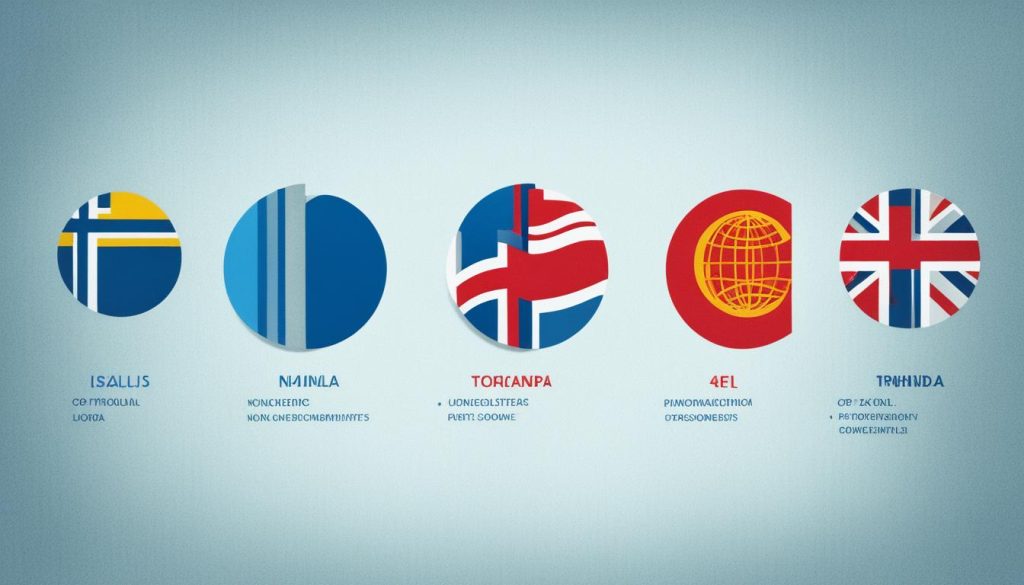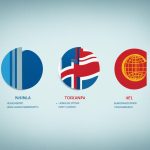The Nordic countries—Denmark, Finland, Iceland, Norway, and Sweden—have strong economies. Together, they generate over $1.7 trillion in GDP. These nations are leaders in innovation and have a highly skilled workforce. They are also dedicated to caring for the environment and ensuring social welfare.
These countries are attractive to businesses around the world. Their collaborative and equal cultures are key to their success. They value life quality, environmental preservation, and social welfare. To do business in the Nordics, it’s crucial to understand these unique features.
Key Takeaways
- The collective GDP of the Nordic economies exceeds $1.7 trillion.
- Nordic countries are renowned for their innovation and progressive cultures.
- A high standard of living is prioritised, supported by strong social welfare systems.
- Environmental care is integral to Nordic societal values.
- Understanding these attributes is crucial for successful business engagement in the region.
Overview of Nordic Economies

The economies in Denmark, Finland, Iceland, Norway, and Sweden are known for strong GDP numbers and diverse exports. Their advanced industries provide excellent opportunities for business investments.
Denmark’s Economy
Denmark’s economy stands out with a GDP of $362 billion. It is boosted by sectors like pharmaceuticals, maritime shipping, and renewable energy. This makes Denmark a key player in Europe.
Finland’s Economy
Finland shows remarkable economic growth with a GDP of $279 billion. It is driven by information technology, clean technology, and forestry. This highlights Finland’s industrial variety.
Iceland’s Economy
Iceland might have fewer people but its GDP is a strong $21.7 billion. Tourism, fisheries, and renewable energy contribute to its vibrant economy.
Norway’s Economy
Norway boasts a GDP of $405 billion, showing its economic power. Petroleum and gas exports are key, making Norway a top global energy supplier.
Sweden’s Economy
Sweden leads the Nordic countries with a GDP of $515 billion. Industries like machinery, automotive, and chemicals. Plus, its trade activities make Sweden a central trade link.
Business statistics and culture in the Nordic countries
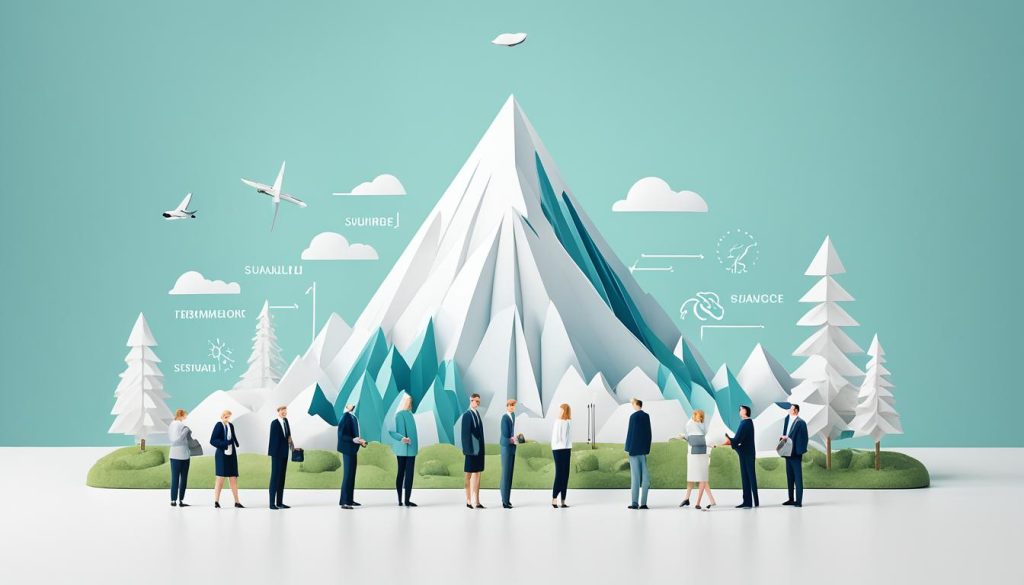
The business culture in the Nordic countries puts work-life balance first. This stands out in their unique organisation and cultural practices. It’s one reason for their high productivity.
In Norway, businesses operate with flat structures and build on trust. This setup makes things more open and improves communication. Sweden sees being on time as essential, showing respect in business.
Finland values direct and formal interactions, which helps in getting things done efficiently. Denmark, however, favours an informal setting that boosts cooperation and respect among workers.
Iceland mixes personal relationships with formal business dealings. This balance leads to friendly yet effective work situations, highlighting the role of personal connections.
The unique cultural aspects in these countries drive their business success. Adopting these practices results in both high productivity and a positive work atmosphere. It’s a balance of professional and personal life at its best.
Innovation in the Nordic Region
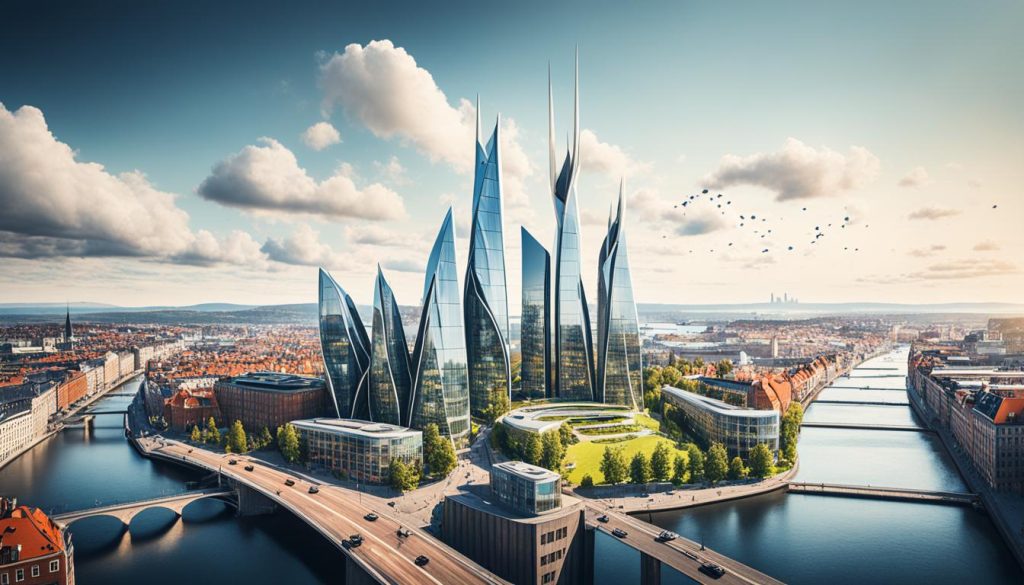
The Nordic countries lead in innovation, focusing on both the economy and the environment. They use top technologies and creativity in business. This makes them strong competitors globally.
Technological Advancements
In technology, the Nordics are ahead. Areas like digital change and the bioeconomy are where they shine. In Sweden and Finland, businesses work on new technologies for our digital world.
Green Technology Initiatives
Green technology is key in the Nordics. Denmark and Norway spend a lot on eco-friendly projects to cut carbon and help the planet. This not only helps the environment but also makes the Nordics leaders in sustainable growth.
Workplace Culture in Nordic Countries

In Nordic countries, the workplace is all about fairness and looking after each other. Everyone wants to make sure their coworkers are happy and included. This kind of care helps everyone do their jobs better and feel happier at work.
Hierarchy and Structure
Workplaces in the Nordics are not much into strict hierarchies. Everyone talks and works together very easily. They like keeping things simple and open, which lets everyone feel valued. When workers feel they can share ideas, they come up with more creative solutions.
Work-life Balance
Good work-life balance is very important in Nordic jobs. They make sure you have enough time for both work and play. Jobs usually have you work 37 to 40 hours a week. This shows how much they value your personal life too.
Flexibility at work is also big. You can often arrange your working hours to fit your life outside the job. Being able to do this helps everyone live healthier and happier. It’s a win-win for employees and their workplaces.
Language and Communication

To do well in business in the Nordics, it’s key to grasp Nordic communication. The area uses several languages, like Swedish, Danish, Norwegian, and Finnish. Alongside, there’s a high level of English, aiding international trade and teamwork.
Talking business here means clear and straight talk. Meetings are no-fuss, valuing honesty and clearness. With the high English skills, dealing with Nordic businesses is straightforward.
Besides English, many Nordic people know other European languages. This skill helps in dealing globally. Their language skills help in overcoming communication challenges, making business smoother.
Show respect for their native languages to show you value their culture. This respect is welcomed. The mix of local languages and good English makes the Nordics a great place for business.
Navigating Meetings and Negotiations

The art of managing meetings and negotiations in the Nordic region involves inclusiveness and planned agendas.
This environment supports democratic input. It ensures that everyone’s contributions are heard and appreciated. This enhances the discussion process.
Meeting Etiquette
Being punctual is critical in Nordic meetings. It shows respect and professionalism. Meetings start on time and follow a clear agenda. This helps make negotiations efficient and saves time. The setting is usually informal, which encourages open talks. Everyone is urged to share their thoughts.
Decision-Making Processes
Decision-making in Nordic businesses is a team effort. Decisions are made together, not by one person alone. This shows the high value placed on equality. Every person’s views are considered, leading to decisions based on solid data. This highlights the need for transparency and accuracy.
Punctuality and Time Management

In the Nordic region, being on time is taken very seriously in business. Denmark, Sweden, and Norway value punctuality because it shows respect for both personal and professional time.
But it’s not just about being on time for meetings. In Scandinavia, managing deadlines properly is also key. This ensures projects finish on time and meet the high standards expected.
Their strict approach to time management shows just how seriously they take their work. Companies known for being punctual are seen as reliable. This builds trust and credibility in the market.
If you want to do well in Scandinavia, you need to embrace punctuality. It shows you’re professional and respect the cultural importance of time.
Dress Code in Nordic Workplaces

Nordic workplaces have a dress code that mixes formal with comfy informality. This mix comes from their unique culture and weather. It affects how professionals look and interact in this region.
Formal and Informal Attire
In Scandinavia, work clothing swings from formal to informal, usually settling on smart casual. In Norway and Sweden, there’s a mix of formality with comfort. This mix encourages both flexibility and practicability. Denmark, though, goes for more casual office wear, showing its laid-back business vibe.
Cultural Influences on Dress Code
The culture and cold climate shape Scandinavian business dress. The chill necessitates wearing layers. Thus, formal dress codes are tweaked to include comfort and warmth. This makes casual office clothing more common.
Business Etiquette: Greetings and Introductions
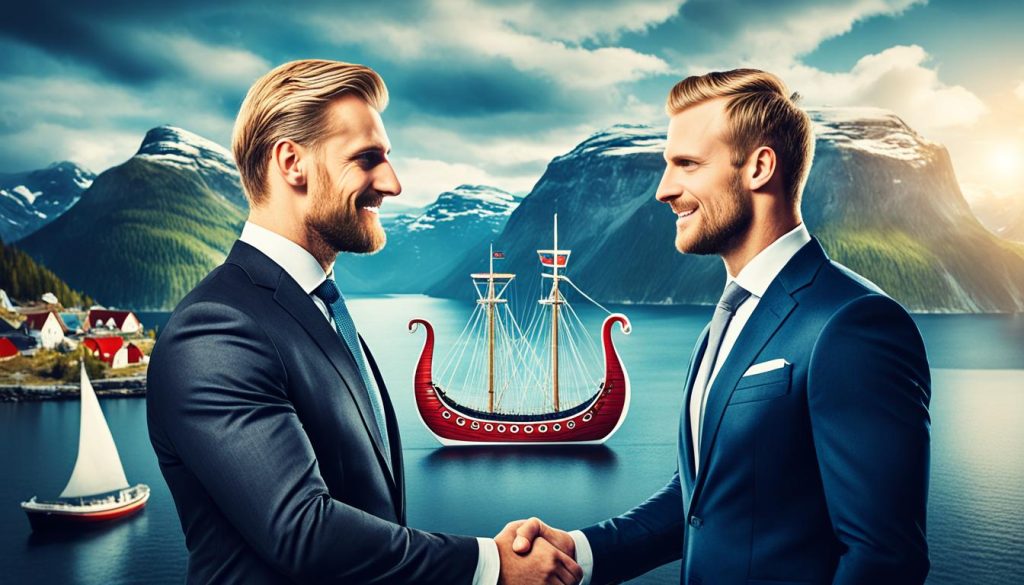
Good communication and correct introductions are key in the Nordic countries for successful business ties. Knowing the expected manners greatly affects your business dealings. This guide will help you learn important aspects of Nordic greetings and introductions.
Common Greetings
In the Nordics, greeting in business usually means a firm handshake with direct eye contact. It shows you’re sincere and respectful. A smile is common too, but don’t be too enthusiastic. Business greetings might also include a nod or a quick “Hej” in Swedish or “Hei” in Finnish, showing you’re friendly and professional.
First Names vs. Titles
Using first names instead of titles is normal when talking to colleagues or business partners in Scandinavia. This reflects the equal nature of their societies. For example, in Denmark and Sweden, first names are often used, making interactions more friendly. But, in formal situations or at first meetings, titles and last names are suitable until everyone agrees to use first names.
To sum up, knowing how to greet and introduce yourself in the Nordic way can lead to better business relationships. Showing you understand their cultural values through these actions will make your professional connections stronger.
Role of Sustainability in Nordic Businesses
Nordic companies value sustainability, balancing economic growth with caring for the environment. They focus on being socially responsible and environmentally friendly. This way, they ensure their business activities do no harm.
Green technology is a big deal in these countries. Denmark, Finland, Iceland, Norway, and Sweden use eco-friendly methods to cut waste and emissions. Their goal is to protect our planet for the children of tomorrow.
- Denmark leads with its pioneering wind energy solutions, reflecting its robust focus on renewable energy sources.
- Finland’s forest management and bioeconomy sectors exemplify the successful integration of sustainability into traditional industries.
- Iceland harnesses its geothermal energy potential, setting a global benchmark for clean energy utilisation.
- Norway’s initiatives in electric vehicles and emission reduction systems showcase the practical application of sustainable innovations.
- Sweden excels in recycling and waste management, presenting a model of circular economy practices.
For Nordic firms, being responsible is about more than just following rules. It’s about being open and reliable. They believe caring for society is as important as protecting the environment. This view helps them gain trust worldwide.
These businesses show that it’s possible to be economically successful and environmentally careful. They lead by example, proving that business and eco-responsibility can go hand in hand.
Foreign Direct Investment in the Nordic Region
The Nordic region is a big draw for foreign investments. Its excellent location and highly skilled workers make it attractive. A strong focus on new technology also plays a part in its success.
Trends in Investment
More and more investments are flowing into the Nordic countries, with Sweden at the forefront. Factors like political stability and forward-thinking economic policies contribute to this growth. The investment has spread across tech, green energy, and health, which helps the economy grow steadily.
Impact on Local Economies
Foreign investment brings much-needed capital and new technologies to the Nordics. It boosts local economies by sparking innovation and creating jobs. Cities like Stockholm and Helsinki have become centres of technology, driving the region’s growth. These investments enhance economic strength and future sustainability.
Tourism and Its Economic Significance
The Nordic region is now a top choice for tourists, helping its countries economically. Its beautiful natural sights, cultural spots, and green tourism practices attract people from all over. This interest boosts economies, adds to each nation’s GDP, and creates more jobs, especially in hospitality.
Growth in the Tourism Sector
Nordic tourism has seen impressive growth recently. Iceland has become extremely popular, with visitor numbers soaring. This popularity has led to better infrastructure and services, making the travel sector stronger. Denmark, Norway, Sweden, and Finland are also seeing more tourists, proving the region’s appeal.
Tourism Statistics
Even though 2020 was tough due to the pandemic, the travel industry has shown it can recover. For example, Iceland’s overnight stays have risen sharply, indicating high tourist interest. Cities like Stockholm, Copenhagen, and Oslo are enjoying economic boosts from more hotel stays. This growth in hotel availability shows how important tourism is for economic progress.
Key Industries and Exports
The Nordic countries strongly depend on various key sectors for their exports. Especially important is machinery, which is a major part of their export business. They are also known for their high-quality packaged medicines, showing their prowess in the pharmaceutical field.
Iron and steel are other major exports, highlighting their skill in metal work and manufacturing. The Nordic countries also excel in chemicals, contributing significantly to the global market. Their fisheries sector is crucial too. It provides top-notch seafood that is popular worldwide.
Tourism is also key for these countries, adding to their earnings. They draw countless visitors each year thanks to their beautiful nature, rich culture, and unique tourism activities. This helps balance their economy, showing they have many ways to sustain growth.
- Machinery – Leading export sector with technological advancements.
- Packaged Medicaments – High standards in pharmaceuticals.
- Iron and Steel – Key materials for international trade.
- Chemicals – Important contributions to global markets.
- Fisheries – Premium-quality seafood exports.
- Tourism – Significant economic contributor.
The Nordic region has a mix of well-developed industries that strengthen their role in global trade. This variety shows they are key contenders on the world stage.
Supporting Entrepreneurship and SMEs
The Nordic region shines in its support for entrepreneurs and small businesses. It’s a major part of their economic strength. Support systems make it easier for these small firms to grow, create jobs, and bring new ideas to life.
Government Initiatives
Government efforts are key to boosting Nordic business ventures. They offer funds, advice, and ways to reach customers worldwide. Norway and Sweden, for example, help startups and small enterprises thrive. Through financial support and promoting connections, they kindle the region’s entrepreneurial fire.
Challenges for SMEs
Yet, Nordic SMEs still face obstacles. Crowded markets, tricky rules, and varying demand can slow them down. Despite this, governments step up with tailored programs. They’re working to make rules simpler and markets more reachable. This dedication helps maintain strong small business growth and entrepreneurship across the Nordics.
Building Trust and Relationships
In the Nordic business scene, trust and strong relationships are key. They start by using first names. This friendly approach shows respect and equality. It helps create a bond based on mutual respect and openness.
Open and clear communication is also vital in the Nordics. It makes sure everyone feels heard and valued. This kind of honesty sets the foundation for lasting trust. Transparency in all dealings ensures fairness and integrity.
In the Nordics, equality is very important in business. Treating everyone fairly strengthens team bonds and external partnerships. This makes the business environment better for everyone involved.
A shared commitment to common values and goals is essential. Businesses show they care about everyone’s success. This respectful and open culture leads to strong and lasting partnerships.
Future Trends in Nordic Business Culture
Nordic business culture is changing fast, focusing on innovation, sustainability, and fairness. With new tech, Nordic countries are blending old values with modern tech. This mix is creating smart, future-driven business strategies.
Work-life balance is becoming more important in these countries. Companies are mixing remote and in-office work. This makes workers more productive and happy, staying true to Nordic values of balance.
Nordic firms will collaborate more, both locally and worldwide. Trust and transparency in these cultures will make partnerships easier. This will lead to growth and lasting relationships. The Nordic business world keeps combining tradition with innovation, leading globally.
FAQ
Q: What are the key characteristics of Nordic business culture?
Q: How robust are the economies of the Nordic countries?
FAQ
Q: What are the key characteristics of Nordic business culture?
A: Nordic business culture is known for few levels of bosses, caring a lot about employee happiness, and focusing on balancing work
and life. Teams work together closely and everyone gets a fair say.
Q: How robust are the economies of the Nordic countries?
A: The Nordic economies are very strong, with a combined worth of over
FAQ
Q: What are the key characteristics of Nordic business culture?
A: Nordic business culture is known for few levels of bosses, caring a lot about employee happiness, and focusing on balancing work
and life. Teams work together closely and everyone gets a fair say.
Q: How robust are the economies of the Nordic countries?
A: The Nordic economies are very strong, with a combined worth of over $1.7 trillion. Denmark, Finland, Iceland, Norway, and Sweden all boast impressive GDP figures. This shows they are competitive globally.
Q: What makes Nordic countries attractive for global businesses?
A: Nordic countries stand out for their high quality of life, well-educated workers, and commitment to being eco-friendly. These qualities, along with their strong economies, make them great for global companies looking to invest.
Q: What role does innovation play in Nordic economies?
A: Innovation is key in the Nordics, with a focus on new technologies and eco-friendly solutions. The region leads in sustainable tech and digital transformation, making it a hub for green innovation.
Q: How does the work-life balance in Nordic countries compare?
A: Nordic countries offer an excellent work-life balance, with work weeks ranging from 37 to 40 hours. They also promote flexible working hours and value personal time highly.
Q: How proficient are Nordic countries in English?
A: English is widely spoken in the Nordics, which helps in international business. Despite this, Nordic countries still cherish their own languages for everyday use.
Q: What is the typical meeting etiquette in Nordic businesses?
A: Meetings in the Nordics are welcoming and seek input from everyone, emphasizing punctuality and order. Decisions are made by consensus, relying on careful planning and data.
Q: How important is punctuality in Nordic business practices?
A: Being on time is highly valued in the Nordics, showing respect and professionalism. Nordic people plan their time well, which helps in meeting deadlines and being trustworthy in business.
Q: What are the dress codes in Nordic workplaces?
A: Dress codes in the Nordics range from smart casual to formal. In places like Norway and Sweden, comfort is as important as formality,
while Denmark opts for a more relaxed style. Clothes often reflect both culture and weather.
Q: What are the common business greetings in the Nordics?
A: In the Nordics, greeting someone usually means a firm handshake, eye contact, and a smile. Using first names and respecting personal space show the region’s friendly yet respectful manner.
Q: How do Nordic businesses approach sustainability?
A: Sustainability is central to Nordic companies, focusing on being green and eco-friendly. They lead by example, adopting practices that protect the environment not just locally but globally.
Q: What trends are seen in foreign direct investment in the Nordic region?
A: The Nordic region is becoming increasingly popular for foreign investments, especially Sweden. These investments bring in not just money, but valuable technology and knowledge.
Q: What is the significance of tourism to Nordic economies?
A: Tourism is a growing part of the Nordic economy, with Iceland seeing a substantial rise in visitors. Even with challenges like pandemics, the tourism sector remains strong and vital to the economy.
Q: Which key industries drive Nordic exports?
A: Exports are driven by industries such as machinery, medical products, metals, chemicals, fisheries, and tourism. This diversity shows the economic strength of the Nordics.
Q: How do Nordic governments support entrepreneurship and SMEs?
A: Nordic governments actively support small businesses and start-ups with various programs. This creates a supportive environment for innovation and growth.
Q: What is essential for building business relationships in the Nordics?
A: Trust and strong relationships are key in the Nordics. Being open, fair, and respectful is important. Starting on a first-name basis helps create a welcoming business atmosphere.
Q: What future trends can be expected in Nordic business culture?
A: Looking ahead, Nordic business culture will likely focus more on tech, sustainability, and work-life balance. These will influence how business and culture evolve in the region.
.7 trillion. Denmark, Finland, Iceland, Norway, and Sweden all boast impressive GDP figures. This shows they are competitive globally.
Q: What makes Nordic countries attractive for global businesses?
A: Nordic countries stand out for their high quality of life, well-educated workers, and commitment to being eco-friendly. These qualities, along with their strong economies, make them great for global companies looking to invest.
Q: What role does innovation play in Nordic economies?
A: Innovation is key in the Nordics, with a focus on new technologies and eco-friendly solutions. The region leads in sustainable tech and digital transformation, making it a hub for green innovation.
Q: How does the work-life balance in Nordic countries compare?
A: Nordic countries offer an excellent work-life balance, with work weeks ranging from 37 to 40 hours. They also promote flexible working hours and value personal time highly.
Q: How proficient are Nordic countries in English?
A: English is widely spoken in the Nordics, which helps in international business. Despite this, Nordic countries still cherish their own languages for everyday use.
Q: What is the typical meeting etiquette in Nordic businesses?
A: Meetings in the Nordics are welcoming and seek input from everyone, emphasizing punctuality and order. Decisions are made by consensus, relying on careful planning and data.
Q: How important is punctuality in Nordic business practices?
A: Being on time is highly valued in the Nordics, showing respect and professionalism. Nordic people plan their time well, which helps in meeting deadlines and being trustworthy in business.
Q: What are the dress codes in Nordic workplaces?
A: Dress codes in the Nordics range from smart casual to formal. In places like Norway and Sweden, comfort is as important as formality,
while Denmark opts for a more relaxed style. Clothes often reflect both culture and weather.
Q: What are the common business greetings in the Nordics?
A: In the Nordics, greeting someone usually means a firm handshake, eye contact, and a smile. Using first names and respecting personal space show the region’s friendly yet respectful manner.
Q: How do Nordic businesses approach sustainability?
A: Sustainability is central to Nordic companies, focusing on being green and eco-friendly. They lead by example, adopting practices that protect the environment not just locally but globally.
Q: What trends are seen in foreign direct investment in the Nordic region?
A: The Nordic region is becoming increasingly popular for foreign investments, especially Sweden. These investments bring in not just money, but valuable technology and knowledge.
Q: What is the significance of tourism to Nordic economies?
A: Tourism is a growing part of the Nordic economy, with Iceland seeing a substantial rise in visitors. Even with challenges like pandemics, the tourism sector remains strong and vital to the economy.
Q: Which key industries drive Nordic exports?
A: Exports are driven by industries such as machinery, medical products, metals, chemicals, fisheries, and tourism. This diversity shows the economic strength of the Nordics.
Q: How do Nordic governments support entrepreneurship and SMEs?
A: Nordic governments actively support small businesses and start-ups with various programs. This creates a supportive environment for innovation and growth.
Q: What is essential for building business relationships in the Nordics?
A: Trust and strong relationships are key in the Nordics. Being open, fair, and respectful is important. Starting on a first-name basis helps create a welcoming business atmosphere.
Q: What future trends can be expected in Nordic business culture?
A: Looking ahead, Nordic business culture will likely focus more on tech, sustainability, and work-life balance. These will influence how business and culture evolve in the region.

